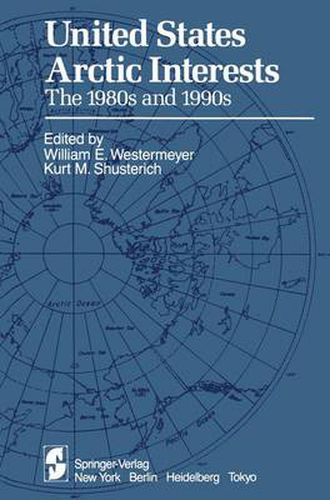Readings Newsletter
Become a Readings Member to make your shopping experience even easier.
Sign in or sign up for free!
You’re not far away from qualifying for FREE standard shipping within Australia
You’ve qualified for FREE standard shipping within Australia
The cart is loading…






This title is printed to order. This book may have been self-published. If so, we cannot guarantee the quality of the content. In the main most books will have gone through the editing process however some may not. We therefore suggest that you be aware of this before ordering this book. If in doubt check either the author or publisher’s details as we are unable to accept any returns unless they are faulty. Please contact us if you have any questions.
Elliot L. Richardson The United States is finally awakening to the fact that it has a major stake in the future of the Arctic. Recognition of the national importance of the Arctic has been slow in coming despite the resource wealth that Arctic Alaska has thus far yielded. Although the United States has had strategic interests in the Arctic since World War II and active oil and gas interests there since the discovery of oil at Prudhoe Bay in 1968, its interest in the Arctic has been low in comparison with that of its Arctic neighbors, Canada and the Soviet Union. What has been described by some as an attitude of neglect toward the Arctic is now changing. The notion of change has become central in most current discussions about the future of the Arctic. It is apparent that the Arctic region is entering a period of greatly accelerated economic, social, strategic, and is political change. The driving force behind the changes taking place resource development activity, and although the present scale of this activity is not inconsequential, it is small in comparison to its projected growth in the next two decades. In short, the Arctic is about to come alive. However, knowledge of the Arctic and experience in the Arctic is comparatively limited. Moreover, competing interests and differing val ues exist among national groups and between countries in the Arctic, just as they do in the lower latitudes.
$9.00 standard shipping within Australia
FREE standard shipping within Australia for orders over $100.00
Express & International shipping calculated at checkout
Stock availability can be subject to change without notice. We recommend calling the shop or contacting our online team to check availability of low stock items. Please see our Shopping Online page for more details.
This title is printed to order. This book may have been self-published. If so, we cannot guarantee the quality of the content. In the main most books will have gone through the editing process however some may not. We therefore suggest that you be aware of this before ordering this book. If in doubt check either the author or publisher’s details as we are unable to accept any returns unless they are faulty. Please contact us if you have any questions.
Elliot L. Richardson The United States is finally awakening to the fact that it has a major stake in the future of the Arctic. Recognition of the national importance of the Arctic has been slow in coming despite the resource wealth that Arctic Alaska has thus far yielded. Although the United States has had strategic interests in the Arctic since World War II and active oil and gas interests there since the discovery of oil at Prudhoe Bay in 1968, its interest in the Arctic has been low in comparison with that of its Arctic neighbors, Canada and the Soviet Union. What has been described by some as an attitude of neglect toward the Arctic is now changing. The notion of change has become central in most current discussions about the future of the Arctic. It is apparent that the Arctic region is entering a period of greatly accelerated economic, social, strategic, and is political change. The driving force behind the changes taking place resource development activity, and although the present scale of this activity is not inconsequential, it is small in comparison to its projected growth in the next two decades. In short, the Arctic is about to come alive. However, knowledge of the Arctic and experience in the Arctic is comparatively limited. Moreover, competing interests and differing val ues exist among national groups and between countries in the Arctic, just as they do in the lower latitudes.